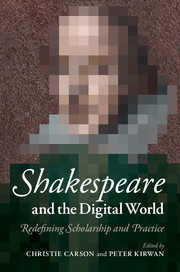Book contents
- Frontmatter
- Contents
- Notes on contributors
- Acknowledgements
- Shakespeare and the digital world
- Part I Defining current digital scholarship and practice
- Part II Defining current digital scholarship and practice
- Half-time: A pause for reflection
- Part III Redefining the boundaries and practices of Shakespeare studies online
- 10 Unlocking scholarship in Shakespeare studies
- 11 Living with digital incunables, or a ‘good-enough’ Shakespeare text
- 12 Shakespeare in virtual communities
- 13 Gamekeeper or poacher?
- Part IV Redefining the boundaries and practices of Shakespeare studies online
- Index
- References
13 - Gamekeeper or poacher?
Personal blogging/public sharing
Published online by Cambridge University Press: 05 July 2014
- Frontmatter
- Contents
- Notes on contributors
- Acknowledgements
- Shakespeare and the digital world
- Part I Defining current digital scholarship and practice
- Part II Defining current digital scholarship and practice
- Half-time: A pause for reflection
- Part III Redefining the boundaries and practices of Shakespeare studies online
- 10 Unlocking scholarship in Shakespeare studies
- 11 Living with digital incunables, or a ‘good-enough’ Shakespeare text
- 12 Shakespeare in virtual communities
- 13 Gamekeeper or poacher?
- Part IV Redefining the boundaries and practices of Shakespeare studies online
- Index
- References
Summary
On 26 April 2007 the British Museum hosted a conference for museum librarians and archivists entitled ‘All Change: Adapt and Thrive in a Digital Age’. After twenty-five years working in the Shakespeare Birthplace Trust’s Library I was at the time the newly appointed Head of Library and Information Resources and my hope was that the day would help me to develop ideas for the future direction of the service, incorporating the digital initiatives sweeping the world of libraries and archives. Although the most important Shakespeare library in Europe, most of the digital projects the library had been involved in had up to then been initiated by external partners. In the middle of a programme packed with reports of projects and software developments was a paper innocently entitled ‘Low-cost Service Development Opportunities’. It was given by Brian Kelly of UKOLN. At the core of his paper was the suggestion that emerging internet technology required information professionals to adopt a fundamental shift of attitude (Kelly, 2007).
Kelly dismissed the idea that only accurate, authoritative information should be posted onto institutional websites, calling it ‘Library Fundamentalism’. Perfection was too expensive and too slow. Writer on libraries Paul Miller was quoted: ‘Users will bypass processes and institutions that they perceive to be slow, unresponsive, unappealing and irrelevant in favour of a more direct approach to services offered by others that just might be “good enough” for what they need to do’ (Miller, 2005). It was no longer possible to launch new software only when the glitches had been ironed out: we now live in what Kelly called a world of ‘perpetual beta’.
- Type
- Chapter
- Information
- Shakespeare and the Digital WorldRedefining Scholarship and Practice, pp. 176 - 186Publisher: Cambridge University PressPrint publication year: 2014
References
- 1
- Cited by



